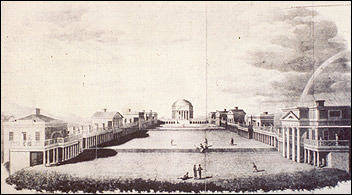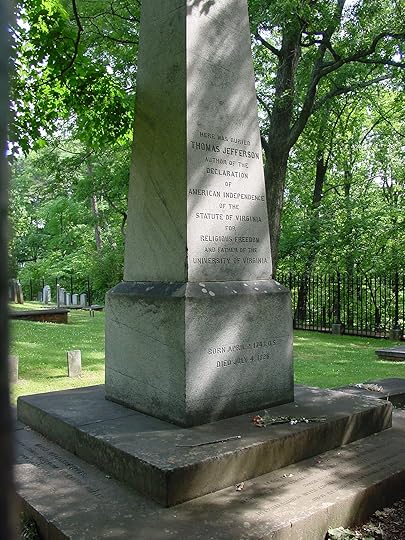The History Book Club discussion

This topic is about
Thomas Jefferson
PRESIDENTIAL SERIES
>
THOMAS JEFFERSON: THE ART OF POWER - GLOSSARY ~ (SPOILER THREAD)
date newest »
newest »
 newest »
newest »
 University of Virginia:
University of Virginia:
Thomas Jefferson founded the University of Virginia in 1819. He wished the publicly-supported school to have a national character and stature. Jefferson envisioned a new kind of university, one dedicated to educating leaders in practical affairs and public service rather than for professions in the classroom and pulpit exclusively. It was the first nonsectarian university in the United States and the first to use the elective course system.
Jefferson considered the founding of the University to be one of his greatest achievements. Undertaking the project toward the end of his life—after a long, illustrious career that included serving as a colonial revolutionary, political leader, writer, architect, inventor, and horticulturalist—he was closely involved in the University's design. He planned the curriculum, recruited the first faculty, and designed the Academical Village, a terraced green space surrounded by residential and academic buildings, gardens, and the majestic center-point—the Rotunda. The most recognizable symbol of the University, the Rotunda stands at the north end of the Lawn and is half the height and width of the Pantheon in Rome, which was the primary inspiration for the building. The Lawn and the Rotunda have served as models for similar designs of "centralized green areas" at universities across the United States.
The University opened for classes in 1825 with a faculty of eight and a student body numbering sixty-eight. Jefferson took great pains to recruit the most highly qualified faculty, five of whom were found in England and three in the United States. Instruction was offered in ancient languages, modern languages, mathematics, moral philosophy, natural philosophy, chemistry, law, and medicine. The students came from the American South and West; interestingly, though, most were not Virginians.
Jefferson opposed the granting of degrees on the grounds that they were "artificial embellishments." In 1824, however, the Board of Visitors authorized granting the master of arts degree. The doctor of medicine, or M.D., was awarded to the first graduates of the School of Medicine in 1828, and the bachelor of laws degree, or LL.B., was first awarded for law school graduates in 1842. The bachelor's degree was awarded beginning in 1849, but became the standard undergraduate degree and a prerequisite for the master's degree in 1899, bringing the University into conformity with other institutions of higher learning. The Ph.D. has been awarded since 1883.
(Source: http://www.virginia.edu/uvatours/shor...)
More:
http://www.nps.gov/nr/twhp/wwwlps/les...
http://www.monticello.org/site/resear...
http://en.wikipedia.org/wiki/Universi...
 UVA's Academic Village:
UVA's Academic Village:
More:
http://www.monticello.org/site/resear...
http://www.virginia.edu/academicalvil...
 Richard G. Wilson
Richard G. Wilson
 Robley Dunglison:
Robley Dunglison:
Dunglison was an eminent English physician, who emigrated to the United States when Thomas Jefferson offered him the chair of anatomy and physiology at the University of Virginia. He later moved to Jefferson Medical College where he remained for the rest of his life.
Dunglison was one of America’s most prolific medical authors, publishing many of his books, as well as translations of texts by prominent physicians of Europe. In his books he did not offer much original work, but what he wrote was readable and accurate, and they were widely used throughout the United States during the early 19th Century.
(Source: http://www.marshall.edu/library/specc...)
More:
http://en.wikipedia.org/wiki/Robley_D...
http://www.robley.org.uk/robley-dungl...
 Jefferson's Gravestone:
Jefferson's Gravestone:
Near the end of his life, probably when he prepared and signed his final will in March 1826, Thomas Jefferson designed his own gravestone and prepared the text to be engraved on it. Here was buried Thomas Jefferson Author of the Declaration of American Independence Of the Statute of Virginia for religious freedom & Father of the University of Virginia.
(Source: http://www.loc.gov/exhibits/jefferson...)
More:
http://www.monticello.org/site/resear...
 Henry Lee IV:
Henry Lee IV:was a Biographer and historian, born in Stratford, Virginia, to Major General Light Horse Harry and Matilda Lee. He was a half-brother of Confederate General Robert E. Lee. In 1808 he graduated from the College of William & Mary. He served as a speech writer for the statesman John C. Calhoun as well as the presidential candidate Andrew Jackson. When Jackson won, Lee helped write the inaugural address. President Jackson rewarded him by a consular appointment to Algeria; the Senate, however, refused the confirmation. His remaining seven years of his life he traveled abroad dying in Paris, France.
(Source: http://en.wikipedia.org/wiki/Henry_Le...)
More:
 & (no image)The life of Napoleon Bonaparte by Henry Lee
& (no image)The life of Napoleon Bonaparte by Henry Lee
 It's very interesting to read what Jefferson considered his most important achievements: The Declaration of Independence, statute for religious freedom, and the University of Virginia.
It's very interesting to read what Jefferson considered his most important achievements: The Declaration of Independence, statute for religious freedom, and the University of Virginia.I would have expected the Louisiana Purchase to be included, but I suppose that too many other hands were involved in that for him to want major credit.
 Probably true, Ann. It is an interesting list. I thought it was a humble statement, buy perhaps it is something more: a statement of his ability to push his ideas to the world.
Probably true, Ann. It is an interesting list. I thought it was a humble statement, buy perhaps it is something more: a statement of his ability to push his ideas to the world.
 Here is an interesting thought: the office of the presidency was different than even 30 years - 100 years. I don't know if TJ saw the presidency as a pulpit, a place to push his ideas.
Here is an interesting thought: the office of the presidency was different than even 30 years - 100 years. I don't know if TJ saw the presidency as a pulpit, a place to push his ideas.Jackson understood the power of the people and then we have Theodore Roosevelt.
Do you think TJ understood the presidency in this way?
 That's an interesting question, Bryan. I would guess that Jefferson did not see the presidency as a pulpit because in the early days of the republic, the average person did not have that much political input. There were a lot of indirect elections (senate, electors for the president), and there were property restrictions on suffrage.
That's an interesting question, Bryan. I would guess that Jefferson did not see the presidency as a pulpit because in the early days of the republic, the average person did not have that much political input. There were a lot of indirect elections (senate, electors for the president), and there were property restrictions on suffrage. However, I haven't read enough to really know. What do you think?
 I get the impression that TJ did not see it as a pulpit. Certainly, the Federal government did not have the responsibility that the modern presidents faced. It may not be his leadership style, anyway, maybe by directing his voice in certain active way, it would be monarchical.
I get the impression that TJ did not see it as a pulpit. Certainly, the Federal government did not have the responsibility that the modern presidents faced. It may not be his leadership style, anyway, maybe by directing his voice in certain active way, it would be monarchical.
 Bentley wrote: "Terrific glossary Bryan. Thank you for your hard work. Great job."
Bentley wrote: "Terrific glossary Bryan. Thank you for your hard work. Great job."Thanks, Bentley, I appreciate your kind words.
 Bryan wrote: "Here is an interesting thought: the office of the presidency was different than even 30 years - 100 years. I don't know if TJ saw the presidency as a pulpit, a place to push his ideas.
Bryan wrote: "Here is an interesting thought: the office of the presidency was different than even 30 years - 100 years. I don't know if TJ saw the presidency as a pulpit, a place to push his ideas.Jackson un..."
A little late for this, but I came across this article a while ago. I do think Jefferson saw the presidency as a pulpit, just not a 'bully' one.
Thanks Bryan
http://www.city-journal.org/html/17_2...
 Great article, G. It adds to the argument that TJ had a vision and used his role as president to push it.
Great article, G. It adds to the argument that TJ had a vision and used his role as president to push it.
 I had to love this part about Jefferson's "least favorite institutions:"
I had to love this part about Jefferson's "least favorite institutions:"It seems likely that Jefferson decided from that moment on that he would make war upon the Barbary kingdoms as soon as he commanded American forces. His two least favorite institutions—enthroned monarchy and state-sponsored religion—were embodied in one target...
Books mentioned in this topic
The Campaign Of 1781 In The Carolinas; With Remarks Historical And Critical On Johnson's Life Of Greene - To Which Is Added An Appendix (other topics)The life of Napoleon Bonaparte (other topics)
Thomas Jefferson's Academical Village: The Creation of an Architectural Masterpiece (other topics)
Jefferson at Monticello. The private life of Thomas Jefferson. From entirely new materials ... By Rev. Hamilton W. Pierson. (other topics)
Injured Honor: The Chesapeake-Leopard Affair June 22, 1807 (other topics)
More...
Authors mentioned in this topic
Henry Lee (other topics)R.G. Wilson (other topics)
Hamilton W. Pierson (other topics)
Spencer C. Tucker (other topics)
Peter Charles Hoffer (other topics)
More...





a Senator from Georgia; born in Nelson County, Va., February 24, 1772; moved with his father to Edgefield District, S.C., in 1779 and to Columbia County, Ga., in 1783; pursued classical studies in a private school and in Richmond Academy, Augusta, Ga.; studied law; admitted to the bar and commenced practice in Lexington, Ga., in 1799; appointed to prepare a digest of the laws of Georgia in 1799; member, State house of representatives 1803-1807; elected to the United States Senate to fill the vacancy caused by the death of Abraham Baldwin and served from November 7, 1807, to March 23, 1813, when he resigned; served as President pro tempore of the Senate during the Twelfth Congress; declined appointment as Secretary of War under President James Madison in 1813; Minister to France 1813-1815; returned home to act as agent for the sale of the land donated by Congress to Lafayette; appointed Secretary of War by President Madison in August 1815; transferred to the Treasury in October 1816, and served under Presidents Madison and James Monroe until 1825; unsuccessful Democratic Republican candidate for President of the United States in 1824; due to illness refused the tender of President John Quincy Adams that he remain Secretary of the Treasury; returned to Georgia and was appointed judge of the northern circuit court in 1827, which position he held until his death in Oglethorpe County, Ga., September 15, 1834; interment on his estate, “Woodlawn,” near Crawford, Oglethorpe County, Ga.
(Source: http://bioguide.congress.gov/scripts/...)
More:
http://en.wikipedia.org/wiki/William_...
http://www.georgiaencyclopedia.org/ng...